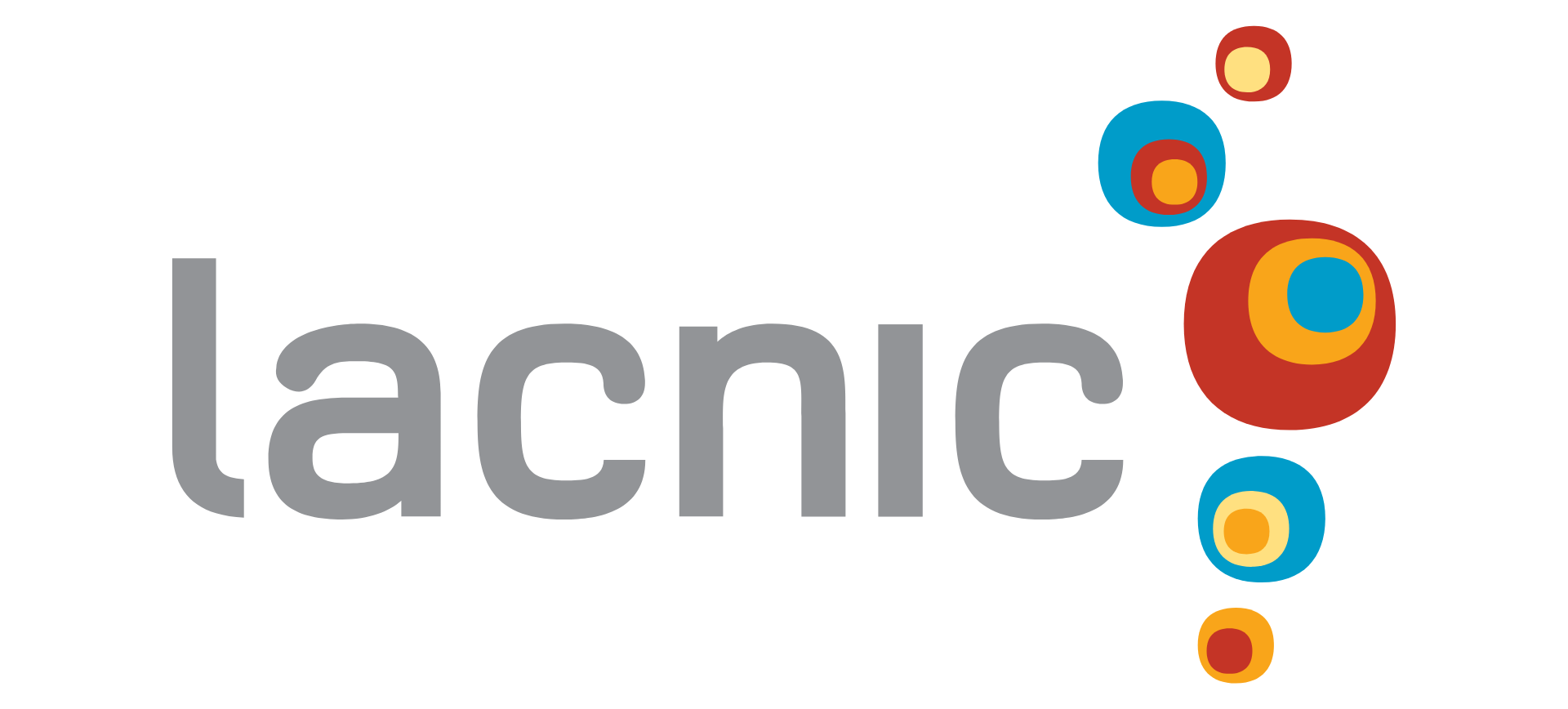LACNIC
| Organization | |
|---|---|

| |
| Type | Non-profit |
| Region | LAC |
| Country |
|
| City | Montevideo |
| Founded | 2001 |
| Websites | |
Latin American and Caribbean Internet Addresses Registry (LACNIC) (Spanish: Registro de Direcciones de Internet para América Latina y Caribe) is one of the five regional RIRs that allocate and administer IP Addresses. LACNIC's central aim is to manage the Internet number resources, including IPv4, IPv6, and ASN. The organization has approximately 13,000 members spread across 33 countries.[1]
Overview[edit | edit source]
LACNIC is the RIR (Regional Internet Registry) responsible for the allocation of IP addresses and other related issues (such as the Autonomous System Numbers and Reserve Resolution) throughout the Latin American and Caribbean region.[2]
LACNIC is a non-profit organization[3] like the other RIRs and its members must comply with its membership requirements.[4] The main members of LACNIC are ISPs and other Internet related organizations.[5]
Their stated mission is:
- To manage Internet number resources for Latin America and the Caribbean, maintaining standards of excellence and transparency and promoting the participatory policy development model.
- To lead the permanent construction of the regional community, strengthening technological capabilities and applied research for the development of a stable, open Internet.[1]
LACNIC History[edit | edit source]
The agreement for founding LACNIC was signed on August 22nd, 1999, soon before the official opening of ICANN 3 in Santiago, Chile. At that time, ARIN was in charge of the Latin America and Caribbean region. Thus, LACNIC developed a business plan and sent it to ARIN; a transition was necessary to enable LACNIC to become the fourth RIR at that time. The other three RIRs at that time were: APNIC, ARIN, and RIPE NCC.
LACNIC headquarters are located in Montevideo, Uruguay, and it was formally established in 2001, even though the business plan was sent and approved in 1999. LACNIC was formally recognized by ICANN during ICANN's 2002 meeting in Shanghai.[6]
LACNIC Functions[edit | edit source]
In order to fulfill its objectives, LACNIC has the following expectations:
- To deal with DNS delegations which must be reversed;
- To allocate the appropriate amount of Internet addresses spaces according to IPv6 and IPv4 standards, as well as Autonomous System Numbers;
- To represent the interests of Internet users and members of the Latin American and Caribbean regions at a global level;
- To maintain the Whois database representative for the Latin American and Caribbean region.[4]
LACNIC Structure[edit | edit source]
The structure of LACNIC consists of:
- The LACNIC members: Influence the activities and services of LACNIC as well as elect candidates to the Executive Board of LACNIC. They are also empowered through their ability to accept new plans and annual finances.
- General Assembly: LACNIC ruling body
- Board of Directors with an Executive Director subordinated: These directors are nominated and elected by LACNIC members. The Board of Directors consists of eight members who eventually appoint the Executive Director. The Executive Director participates in the Board meetings with rights equivalent to those of a director, except for the right to vote.
- Control Organ: Manages and analyzes the activities and actions of the Board of Directors.
- Electoral Commission: In charge of organizing all elections, it consists of five members.[4]
References[edit | edit source]
- ↑ 1.0 1.1 LACNIC: Acerca de LACNIC Retrieved November 7, 2025
- ↑ IANA: Report on Recognition of LACNIC as a Regional Internet Registry Retrieved November 7, 2025
- ↑ LACNIC: LACNIC Transparency Guidelines Retrieved November 7, 2025
- ↑ 4.0 4.1 4.2 LACNIC: Bylaws Retrieved November 7, 2025
- ↑ LACNIC: Membership Fees and Categories Retrieved November 7, 2025
- ↑ LACNIC: Capítulo 2 - La Construcción de LACNIC y su Comunidad Retrieved November 7, 2025
ICANNWiki resources: Special Pages | Content Guide | Documentation | Development || Maintenance: Articles needing attention | Candidates for deletion || Projects: Internet & Digital Governance Library
